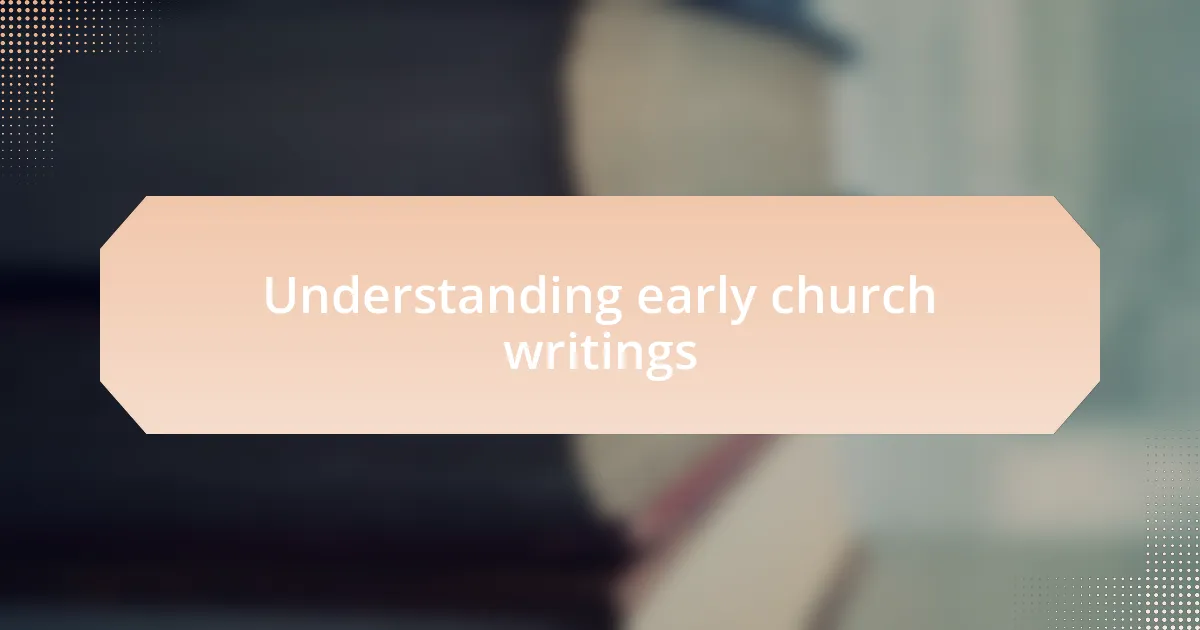Key takeaways:
- Early church writings provide insights into the formation of Christian theology, reflecting the emotional and moral challenges faced by early believers, such as martyrdom and perseverance.
- Religious texts serve as both historical records and moral guiding principles, fostering introspection and personal growth among individuals navigating life’s challenges.
- Applying ancient teachings, like forgiveness and community, can significantly enhance modern relationships and promote a sense of belonging and service.
- Shared exploration of these writings can deepen community bonds and facilitate meaningful conversations about personal struggles and shared beliefs.

Understanding early church writings
Early church writings offer a unique glimpse into the formation of Christian theology and community practices. I can still remember the first time I cracked open the letters of Ignatius of Antioch; it felt like stepping into a conversation from centuries past, where issues of faith, leadership, and moral challenges were addressed with fervor. Isn’t it fascinating how the struggles of those early believers can echo into our lives today?
These texts, including the writings of the Church Fathers and other early leaders, reveal not just doctrinal beliefs but also the emotional landscape of faith during a time of persecution. When I read about Polycarp facing martyrdom, I couldn’t help but feel a deep sense of connection and admiration for his unwavering commitment. The courage displayed in these narratives invites us to reflect on our own faith journeys, doesn’t it?
Understanding early church writings also requires recognizing the cultural and historical context in which they were produced. For example, as someone who has spent time studying different theological perspectives, I find it crucial to consider how societal issues influenced the messages conveyed. Hasn’t the way we view faith been shaped by the challenges of our times? These writings not only serve as a record of beliefs but also as a mirror reflecting the timeless struggles of humanity in seeking a relationship with the divine.

Importance of religious books
Religious books hold immense importance as they serve as the bedrock of belief systems and community identity. The first time I held a worn-out Bible in my hands, the pages felt like a vessel of ancient wisdom, guiding generations in their spiritual journeys. Isn’t it incredible how a single text can unite millions under a shared understanding of faith and purpose?
Moreover, these texts provide not only historical insights but also a framework for moral and ethical living. I remember grappling with a tough decision in my life, and revisiting passages from the Qur’an offered clarity and perspective that I desperately needed. How many times have we turned to scripture for guidance, finding solace and direction in its teachings?
Additionally, religious books encourage introspection and personal growth. When I dissected the teachings of the Bhagavad Gita, it prompted me to confront my own beliefs and motivations. Doesn’t that make you wonder about the transformative power these words have, shaping not just our thoughts but our very actions every day?

Applying teachings in modern life
Applying teachings from early church writings in modern life often requires a nuanced approach. For instance, I recall a time when I faced a challenging relationship. Reflecting on the wisdom of forgiveness found in these texts guided me to let go of grudges, transforming my perspective and enabling healing. Isn’t it fascinating how such ancient principles can provide solutions to our contemporary struggles?
When I think about the emphasis on community found in early church writings, I often draw parallels to today’s world, where connections can feel superficial. I’ve found immense value in reaching out to my neighbors, often inspired by those teachings, leading to unexpected friendships and a strengthened sense of belonging. Have you ever noticed how often simple acts of kindness can ripple through a community?
Additionally, the call for a life of service resonates deeply in our increasingly individualistic society. I began volunteering at a local shelter after reading about selflessness in these writings, which not only enriched my life but also reminded me of our shared human experience. How does serving others help to connect us back to our roots and remind us of what truly matters?

Reflection on personal faith journeys
Reflecting on my personal faith journey, I often find myself revisiting moments where doubt crept in. There was a period when I struggled with my beliefs, feeling distant from my spirituality. During that time, I turned to early church writings and found solace in their raw honesty about faith challenges, reminding me that questioning can lead to deeper understanding. Have you ever felt that what you went through helped you uncover a more profound connection with your faith?
One particularly moving experience was when I attended a gathering focused on communal prayer. Inspired by the practices outlined in early church texts, I realized the importance of shared spiritual experiences. I felt an overwhelming sense of connection—not just to those around me but to a lineage of believers who faced their own struggles. How often do we overlook the power of unity in our spiritual lives?
In moments of grief, I have turned to these writings for comfort. Reflecting on the early church’s teachings on hope and resurrection allowed me to find light in my darkest times. It’s incredible how such timeless messages can resonate through the ages, isn’t it? In my journey, I’ve learned that embracing vulnerability can lead to profound healing and renewal.

Building community through shared writings
Building community through shared writings can be a transformative experience. I recall a time when my small group decided to explore a collection of early church letters. As we gathered each week, sharing our reflections, we quickly found that our conversations deepened our bonds. Have you ever encountered a shared text that completely shifted your perspective on your community?
In one memorable discussion, we tackled a particularly challenging letter, which addressed forgiveness within the faith community. I opened up about my struggle with forgiving someone close to me, and to my surprise, others shared their own stories of hardship and healing. It struck me how these ancient writings guided us to connect over our most profound struggles. Isn’t it fascinating how centuries-old texts can facilitate such genuine conversations?
Looking back, it’s clear that these shared writings weren’t just words on a page—they were a catalyst for unity. Each session brought new insights and stories, reinforcing a sense of belonging. The more we explored these texts, the more I felt a part of something larger than myself. Can you think of a time when a piece of writing helped you foster connections with others? It’s moments like these that truly illustrate the power of community built around shared beliefs and experiences.